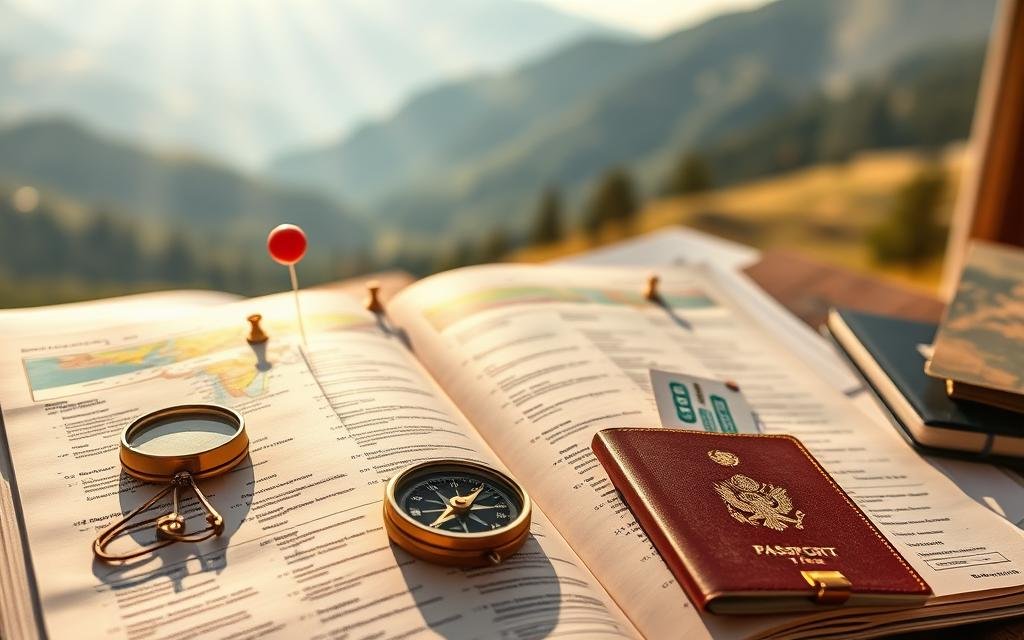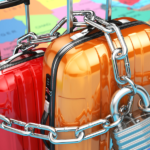Starting a new journey to exciting places is thrilling. But having the best travel guide can turn a good trip into a fantastic adventure. Imagine exploring Paris with tips from a local expert or confidently navigating Tokyo’s busy streets thanks to a great travel guide.
A travel guide is more than a book. It’s a tool packed with the best travel tips and insights into top destinations. For example, ‘Elsewhere by Lonely Planet’ lets you create a personalized itinerary with 24/7 support. This ensures your trip is planned and executed with care and detail.
The 2020 Wanderlust Reader Travel Awards clearly demonstrate the importance of a good travel guide. DK Eyewitness was the top choice, praised for its visuals and practical tips. Lonely Planet was second, known for its detailed facts and budget-friendly options. Rick Steves’ guides are updated in person, focusing on select spots for the latest and most reliable information.
Whether you’re going solo, with family, or on a romantic trip, picking the right travel guide is key. It can make your travel experience better. Explore why you need a travel guide and how it can change your adventures.
Key Takeaways
- Travel guides offer essential information and practical travel tips to enhance your journey.
- Partnering with local experts can provide personalized and insightful travel experiences.
- A good travel guide helps you quickly uncover hidden gems and navigate local customs.
- DK Eyewitness and Lonely Planet are top choices, recognized for their extensive content and usability.
- Using trusted travel guide resources ensures a reliable and enriching travel experience.
Why You Need a Travel Guide for Your Adventures
Starting a new journey can be thrilling and scary. A good travel guide makes your trip better and more fun. Let’s examine why having a travel guide is so important.
Understand Your Destination
A travel guide gives you expert advice, helping you get to know your destination better. Rick Steves says it’s key to have current information to avoid problems. Guides also teach you about history and culture so you can really get to know the place.
Navigate Local Customs
Guides from Lonely Planet and DK Eyewitness help you understand local customs easily. They share real experiences from locals, giving you a peek into the area’s traditions. This way, you can travel with respect and enjoy your trip more.
Discover Hidden Gems
Travel is also about finding secret spots that aren’t in regular guides. These guides show you places off the beaten path. You might see a hidden beach or a secret café, making your trip memorable.
“Using a travel guide can transform your vacation experience, providing enhanced safety, access to local knowledge, and the ability to connect with the destination on a deeper level.”
– Rick Steves
| Reason | Benefit |
|---|---|
| Gaining cultural insights | Personal anecdotes and stories from locals |
| Personalized tour experience | Itineraries tailored to your interests |
| Promoting responsible tourism | Ethical and sustainable travel choices |
| Environmental stewardship | Education on conservation efforts |
| Comfort and peace of mind | Reduction of logistical challenges |
Types of Travel Guides Available
There are many travel guides out there, each catering to different needs. Whether you prefer a physical book or digital options, there’s something for everyone. This makes planning your trip easier and more enjoyable.
Printed vs. Digital Guides
Printed guides, like those from Lonely Planet and Rough Guides, are excellent for those who enjoy detailed cultural and historical information. They include maps, photos, and tips, but they might not have the latest updates or personalized advice.
Digital guides, such as apps and online resources, offer fresh info and tips from other travelers. They’re perfect for last-minute planning and finding travel hacks.
Guided Tours vs. Self-Guided Options
Guided tours provide set itineraries and expert knowledge, helping you see the best spots. Rick Steves and others highlight the value of places rich with history, making the journey more meaningful with their stories.
Self-guided travel, on the other hand, lets you set your own pace. It’s ideal for those who want a trip tailored to their interests. Many use apps or e-books to plan their adventures.
Specialized Travel Guides for Specific Interests
Specialized guides focus on unique interests. History buffs might enjoy Blue Guides for deep dives into historical sites. Nature enthusiasts and food lovers also have their guides.
Check out Monocle Travel Guide Series and Wallpaper* City Guides for a taste of urban life. They offer insights into cities, art, and culture, enriching your travel experience.
Top Travel Guide Resources to Explore
Exploring new places is easier with the proper travel guides. You can find everything from traditional guidebooks to mobile apps and top travel websites. These resources help plan your trip to the best destinations and make it enjoyable.
Popular Travel Guidebooks
Lonely Planet, DK Eyewitness, and Rick Steves are fantastic for those who love printed guides. They offer detailed maps, cultural insights, and practical tips. 100 Places in France Every Woman Should Go by Marcia DeSanctis and The Complete Insider’s Guides for Women by Erica Stewart are perfect for women travelers. They offer advice and personal stories for a richer experience.
Mobile Apps Worth Downloading
Mobile apps are key for today’s travelers. Skyscanner finds the best flight deals by searching small websites and budget airlines. Going (formerly Scott’s Cheap Flights) sends them to your inbox for fantastic flight deals. Apps like Hostelworld and Booking.com make booking places to stay manageable, with many affordable options.
Apps like Get Your Guide offer tours and excursions. You can try local experiences like cooking classes and street art lessons.
Reputable Travel Websites
Travel websites are full of helpful information and tools. The World Travel Guide (WTG) is in many languages and covers cities, airports, attractions, and more. It includes unique experiences like adventure travel and cultural tours. Guides are available for places like Osaka, Paris, and the Islands of Tahiti.
For accommodations, Trusted Housesitters lets you stay for free by pet sitting. Discover Cars makes car rentals easy by searching thousands of locations for the best deals.
Planning Your Trip: Using a Travel Guide
Traveling can be incredibly rewarding. The right travel planner makes your journey better. A good itinerary and budget plan are key to a great vacation. Here are some tips for planning an unforgettable trip with a travel guide.
Setting an Itinerary
Using apps like Wanderlog is a great travel tip. It has over 1 million users and helps you plan your trip. You can make detailed itineraries and use Google Maps to find the best routes.

Budget Planning
Managing your budget is essential. Rick Steves says updated travel guides help you spend wisely. Wanderlog’s budget feature lets you track your expenses, keeping you within budget.
Important Travel Tips
Guidebooks are full of helpful travel tips. They help you navigate cities and respect local customs. Always check the political situation and travel advisories. Also, I want to learn about local culture and events for a richer experience.
By following these tips, you can create a travel planner that meets your needs and improves your trip.
Local Insights from Travel Guides
Travel guides are key for those wanting to see new places. They share insights on local customs, food, and family fun activities. They give you more than just places to visit; they make your trip unforgettable.
Cultural Etiquette
Knowing local customs is essential when visiting new places. Travel guides explain these customs to help you respect and enjoy the culture. For example, Amelia Island offers cultural tours that let you dive into its African American heritage.
Cuisine Recommendations
Tasting local food is a highlight of travel. Amelia Island has many dining spots, from fancy to casual. Guides suggest places for authentic tastes, helping you enjoy local dishes.
Activities for All Ages
Family-friendly activities are key for many travelers. Amelia Island is great for families because of its golf, festivals, and more. Guides highlight these activities, ensuring fun for everyone, regardless of age.
| Amelia Island Highlights | Experience Details |
|---|---|
| Beaches and Nature | Stunning beaches and rare maritime forest ecosystems |
| Dining | A diverse range of dining options, from fine dining to casual outdoor eateries |
| Golf | 99 holes of championship golf courses |
| Cultural Events | Year-round festivals, concerts, and art performances |
| Family Activities | Wide range of activities suitable for all ages |
Travel guides offer deep insights, making your trip better. They help you explore and enjoy your destination more, with a deeper cultural connection.
Navigating Transportation with Travel Guides
Getting around an unfamiliar city can feel daunting, but with the right travel guide, it’s much easier. Rick Steves and other experts share tips to make your trip smoother. They help you plan your journey with the best travel hacks and expert advice.
Public Transit Options
Public transport varies worldwide, so knowing your options is key. Check safety, reliability, and ease of use before you go. For easier travel, use apps like Transit, Moovit, or Citymapper.
Learning basic phrases in the local language is also helpful. It can help you ask for directions or help others. A tourist transport pass, like the Paris Visite Pass, can save you money and time.

Rick Steves suggests taking screenshots of transit maps for offline use. He also recommends watching YouTube videos to learn about local transit systems and rules. This way, you won’t get lost without internet.
Car Rentals and Alternatives
Renting a car gives you more freedom, perfect for rural areas or places with poor public transport. Taxis start at about $3, with extra costs for each mile. Always tip drivers 10%-15% and pay with cash to avoid additional fees.
For short trips, bike and scooter-sharing services like Bird, Lime, and Veo are great. They’re cheap and good for the environment.
Walking Tours
Exploring a city on foot is a great way to see it up close. Many guides, including Rick Steves, offer walking tours that take you to major sights and hidden spots.
Walking tours give you a real feel for local life. You can enjoy the city at your own pace.
With a good travel planner and expert advice, your trip will be smooth and fun. Knowing when to use public transport, rent a car, or walk will improve your journey.
Travel Safety Tips Found in Guides
Planning an adventure means keeping safety first. A good travel guide offers many tips to make your trip safer and more fun. Being alert and ready can turn a smooth trip into a great one.
Staying Aware of Your Surroundings
Travel guides stress the need to know your surroundings. Use resources like the Country Information pages to research your destination’s safety, crime rates, and areas to avoid.
Wear clothes that help you blend in, avoid flashy jewelry, and don’t carry too much cash. In new places, use GPS maps that work offline.
Emergency Protocols
Knowing emergency plans is key. Sign up for the Smart Traveler Enrollment Program (STEP) for health updates and emergency contacts. Keep local emergency numbers, like the embassy and police station, handy.
Also, keep digital copies of important documents like your passport. This can be very helpful in emergencies.
Health Considerations
Travel guides also focus on health. To avoid trouble, check local laws and customs and wear clothes that fit in with the local culture.
Drink responsibly and watch your drink in public. Don’t share travel plans on social media until you’re back. Use trusted transport services to check the driver’s details.
Stay safe by avoiding dangerous areas and listening to local advice. You can enjoy a safe and memorable trip with a good travel guide.
Sustainability in Travel Guides
Today’s travel guides focus on sustainable travel. This is key to fighting climate change and saving our Planet. We’ll look at eco-friendly travel tips, responsibly supporting local businesses and wildlife tours
Eco-Friendly Travel Recommendations
Choosing eco-friendly places to stay can reduce your carbon footprint. Eco-certified hotels use less waste, chemicals, and water, making your trip more sustainable.
Did you know a night in a UK hotel can produce 31.1kg CO2? Choosing greener options helps reduce this.
- Pack refillable water bottles, coffee cups, and reusable containers to decrease single-use plastic waste.
- Travel by train wherever possible, as it emits six to ten times less CO2 than flying.
- Eat local, seasonal food to cut down carbon emissions from food transportation.
- Use carbon offsets to balance the environmental impact of flights.
- Minimize luggage to reduce fuel consumption.
Supporting Local Businesses
Supporting local communities and businesses is vital for sustainable travel. Eating at local restaurants and buying from local vendors boost the local economy and help you connect with the culture more deeply.
A good travel guide can lead you to family-run places and unique experiences., ensuring that your money goes tothe places you visit.
“Costa Rica and Guyana have been pioneers in promoting ecotourism and protecting their rainforests through policies that encourage visitor support of local economies.”
Responsible Wildlife Tours
Responsible wildlife tours are key to ethical travel. Look for guides that focus on wildlife conservation and responsible tourism. This way, your visits won’t harm the animals or their habitats.
The natural emergency threatens 1 million animal and plant species globally. Making mindful choices in your travel can help prevent this disaster.
| Type | Environmental Impact |
|---|---|
| Travel by Train | Up to 10 times less CO2 than flying |
| Eco-Certified Accommodations | Reduces waste, chemical use, and water consumption |
| Reusable Items | Decreases single-use plastic waste |
| Local Seasonal Food | Lower emissions from food transportation |
| Support Local Businesses | Economic and cultural benefits to local communities |
By adopting these sustainable practices, you help protect our Planet. Your travel guide can help you make eco-friendly choices. Enjoy your journey while doing good for the environment.
How to Choose the Right Travel Guide
Choosing the right travel guide is key to a great trip. Think about what you like, read recent reviews, and pick a guide that fits your style. Here’s how tochoosek the best one for you.
Assessing Your Travel Style
First, know your kind of traveler. Do you love exploring new places or prefer the finer things in Western Europe? For example, Rough Guides are excellent for adventurous trips in places like Southeast Asia and South America. On the other hand, Frommer’s Guides are perfect for luxury travel in Western Europe.
Knowing what you want helps you find the correct guidebook. It should match your travel dreams.
Reading Reviews and Recommendations
It’s essential to read what others say before buying a guide. Travel expert Rick Steves recommends checking out Amazon’s “Look Inside” feature or visiting a bookstore to see if the guide is right for you.
Look at how different guides describe places you know. Guides like Fodor’s and DK Eyewitness are known for their detailed descriptions and highlights of top attractions, mainly in European cities.
Personalizing Your Guide Experience
Choose a guide that you can customize to fit your needs. Guides like Blue Guides for history lovers or Insight Guides for those who love visuals offer unique content. Smaller publishers like Moon Travel Guides give tips on less-known places perfect for special interests.
Think about what matters most to you. Do you want practical tips or to be immersed in the culture? Pick a guide that matches your preferences.
Your trip will be well-planned, fun, and memorable with the right travel guide. Use these tips to make your next adventure truly special.




